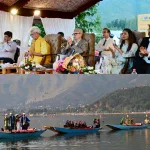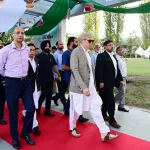New Delhi demonstrated excellent strategic foresight by declining U.S. President Trump’s invitation to Prime Minister Modi for a stopover in the United States after the G7 summit. It went on to exhibit India’s deep understanding of the shifting geopolitical theatre and the pitfalls of symbolic diplomacy.
While officially framed as a scheduling constraint, the decision reflected careful deliberation within the Prime Minister’s Office (PMO) and the Ministry of External Affairs (MEA), and a clear-headed recognition of the potential minefield it would have created. The choice, it seems, was informed by a sharp understanding of the associated bad optics and consequences.
The Indian side recognised early on that accepting such an invitation, particularly in the context of Donald Trump’s parallel engagement with Pakistan Army Chief General Asim Munir, would risk legitimising a deeply flawed and outdated Western narrative, one that misleadingly portrays India and Pakistan as moral, strategic or political equals. This framing is not only factually inaccurate but dangerously reductive.
To appear alongside a figure like General Munir, whose institution has long been engineering and exporting cross-border terrorism, would have amounted to more than an uncomfortable photo opportunity. It would have sent a message that the world’s largest democracy, an emerging global power and a long-standing victim of terrorism, was being bracketed with a militarised, crisis-ridden neighbour whose establishment continues to shield, support and enable terror actors, often against both India and the West. It is not just diplomatically untenable; it is an affront to India’s national dignity and to the memory of those who have suffered from the consequences of Pakistan’s proxy wars.
This would have been deeply insulting not only to the Indian state but also to the countless victims of terrorism in the subcontinent and the West. It would have undermined years of India’s diplomatic efforts to “de-hyphenate” itself from Pakistan in international forums, a project built on India’s democratic credentials, economic rise, institutional resilience and global partnerships. Worse still, it would have lent legitimacy to the very power structures in Pakistan that have resisted democratic reform, fuelled regional instability and manipulated peace overtures for tactical gain.
What makes this even more ironic and troubling is Donald Trump’s own history. Trump himself, in the past, has repeatedly called out Pakistan for taking billions in U.S. aid while providing safe havens to anti-American terror groups and for being no friend of the United States. In a series of pointed tweets, he accused Islamabad of “lies and deceit”, slammed its role in harbouring Osama bin Laden and suspended billions in U.S. aid. He made it clear that Pakistan was not acting as an ally but rather as a destabilising actor, playing both sides in the war on terror. These were not obscure diplomatic cables; they were Trump’s own remarks and televised statements.
That same Trump is now openly courting Pakistan’s military leadership, allegedly and apparently at the behest of private power brokers within the Pakistani-American community who maintain ties to Republican circles. The reports of a White House dinner held in honour of General Munir, allegedly facilitated through unofficial lobbying channels, are not just a diplomatic anomaly; they are a moral contradiction. To re-engage with the Pakistani military without any meaningful shift in its conduct or accountability mechanisms, particularly after a string of terror attacks in India, Pahalgam being the most prominent and recent one, sends the worst possible signal to both victims of terror and democratic allies.
India saw this coming. The decision to refuse Trump’s invitation was more than prudent; it was principled. It preserved not just New Delhi’s diplomatic integrity but also India’s moral position in a region where lines are often blurred by opportunism. India’s democratic leadership had nothing to gain and everything to lose by sharing space, even symbolically, with a controversial military figure implicated in regional destabilisation.
Trump’s behaviour in this context appears less the product of considered diplomacy and more a reflection of flawed strategic calculus and personal vanity. He has long exhibited a tendency to insert himself into conflicts and peace processes where he is neither needed nor welcome, often in ways that complicate delicate regional balances. His instinct to make every engagement about himself has repeatedly undermined years of bilateral progress. His insistence on hyphenating India and Pakistan, despite strong and repeated objections from New Delhi, speaks either to a profound misunderstanding of South Asia or a wilful disregard fuelled by ego and showmanship.
New Delhi’s snub, guised as a polite decline, was a clear signal that ego-driven diplomacy cannot dictate sovereign choices.
India has worked tirelessly to separate itself from the narrative of South Asian instability, proving itself instead as a constructive global partner, a voice for the Global South, a leader in digital innovation, a destination for global investment and a responsible nuclear power. Pakistan, on the other hand, continues to grapple with economic collapse, political breakdown and a military establishment that sees stability as a threat to its own relevance. The two nations are not on parallel tracks and never will be, and to pretend otherwise is to indulge in dangerous simplifications.
The Indian Prime Minister would think several times before meeting even his Pakistani counterpart, a civilian leader with limited power under the shadow of the military. The suggestion that he might have shared a symbolic platform with Pakistan’s army chief is not only absurd; it is offensive. The asymmetry in legitimacy, governance and public mandate is simply too vast.
General Asim Munir’s self-elevation to the rank of Field Marshal after what his establishment calls a “victory” over India in the recent standoff between the two countries, followed by a ceasefire initiated by Pakistan itself through military-to-military backchannel, is emblematic of the self-aggrandising tendencies within Pakistan’s military elite. Trump’s willingness to indulge this theatre, and possibly offer it a global platform, was rightly read by India as an unacceptable provocation.
New Delhi pre-empted a scenario that could have falsely equated India with Pakistan, a contrast it has worked assiduously to clarify on the global stage.
By declining Trump’s invitation, India delivered a subtle but unmistakable message: diplomacy is not performance art, and national sovereignty is not something to be traded or dictated by someone else’s optics. New Delhi made it clear that India will not share a stage, even symbolically, with a regime that has turned terrorism into statecraft. Instead, it seeks alignment with nations that understand the cost of credibility, the value of restraint, and the meaning of strategic depth.
This was not a missed opportunity. It was a calculated refusal, shaped by discipline. In an age when global leadership is often reduced to posturing and soundbites, such clarity of purpose may just be the most valuable currency of all.
(The Author can be reached at: [email protected])








